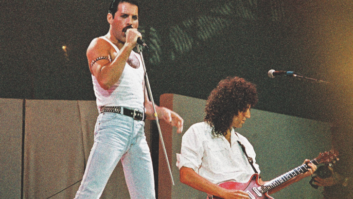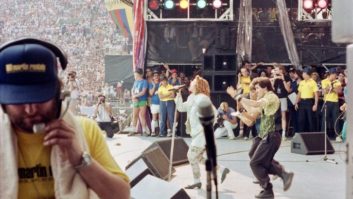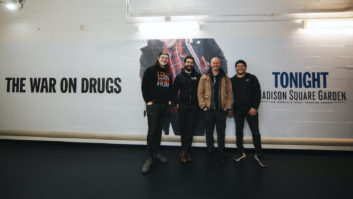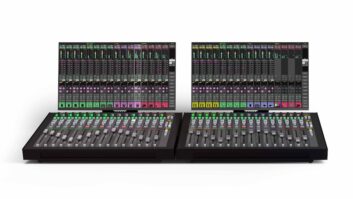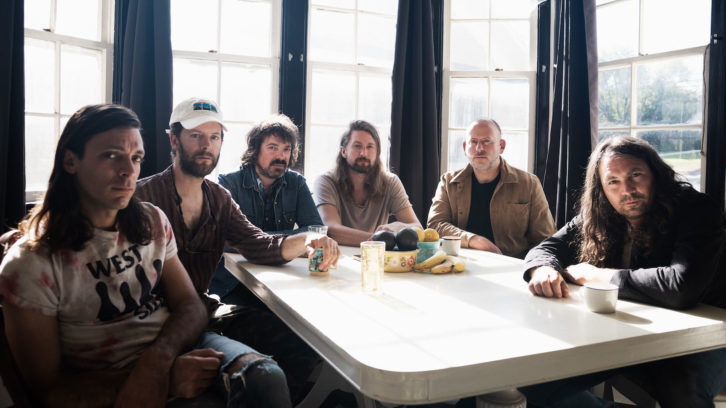
It might never occur to the casual listener that The War on Drugs’ latest Atlantic Records release, I Don’t Live Here Anymore, took years to make, as it has a spaciousness and relaxed vibe that seems to take off from the band’s previous album, the Grammy-winning A Deeper Understanding (Best Rock Album).
But I Don’t Live Here Anymore was three years in the making because achieving that critical balance of intention and laid-back isn’t as simple as it seems, and this band can’t be rushed. Frontman and principal songwriter Adam Granduciel will keep rearranging, rerecording, remixing and even rewriting up until the vinyl is nearly pressed. Shawn Everett, the band’s engineer and co-producer, is all-in with Granduciel’s MO.
“Adam likes the paint to still be wet throughout the process so that he can keep working on a song until after the very end, and that’s what’s so great about him,” Everett says. “He is not precious about anything, but he cares about all of it. Songs that I think are done, he will come in a day later and he will have upped the game on the melody—pulled more emotion from it—in a way that I could not have foreseen. Some people I know might push back on that, but that’s my favorite thing about working with Adam, that kind of experimentation.”
Sessions for I Don’t Live Here Anymore began soon after A Deeper Understanding was released, with Granduciel inviting a couple of bandmates to join him at Outlier Studio in upstate New York. “I just booked a week of time to get things started,” Granduciel says. “It’s a great studio. It’s pretty remote, but you can stay on the property as an Airbnb. I just went up there with Dave [Hartley, bass player] and Anthony [LaMarca, drummer]. Anthony is a songwriter in his own right, as well as a great drummer—a great everything.
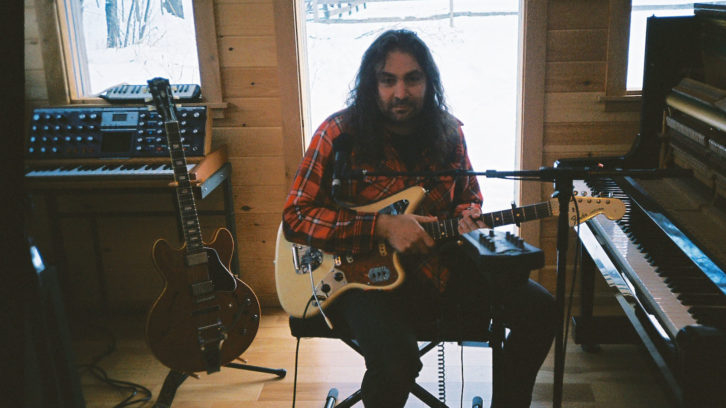
“We spent about a week up there demoing stuff,” he continues. “We would sit in a circle, and I would either play guitar or this Kurzweil piano they had. Then we might get a little bit deeper and overdub some percussion or synth ideas. It was just supposed to be a time when there were no rules. Let’s not try to have 10 songs done or even one song done. If something starts feeling cool, let’s throw more stuff at it and see what happens. We had my friend Nick Krill there recording everything, so we could just concentrate on the songs.”
A couple of Granduciel’s ideas from those initial sessions made it onto the record: the tender song “Change,” with pretty, subtle shades of Petty, Pretenders and others; and the intricate “I Don’t Want to Wait,” with percussion, synths and guitar sounds that seem to pay homage to Peter Gabriel.
“Some of the keyboards from those sessions are on the record,” Granduciel explains. “I ended up pitching them down to meet the new key: We tracked that in F, but I rewrote it in D, so I Melodyned the synths. The patch I had was made up of a lot of white noise, but it ended up sounding really glitchy and weird. That was an amazing happy accident.”
Everett joined the production process for full band sessions a few months later at Electric Lady in New York City. “We did some live band tracking there,” Everett says. “Most of the remaining songs started with a full band track.” Everett captured everything to tape through Pro Tools, and he says there was “tons of tape manipulation.”
In the Studio with The Darkness
“There’s one song [‘Victim’] that was actually called ‘Tape Jam’ for almost the whole time we were making the album,” Everett says. “I had gotten really into tape loops and the ways you could build an arrangement with that. I’d read about how the Talking Heads had done that with Brian Eno back in the day, where they would record these 24-track tape loops and create an arrangement using all the different parts that you might need for a song on one piece of tape. And then when you run the tape loop through the machine and when you play the console, you can create an arrangement.
“We did that with a drum loop that Adam had done on his own, where we had this enormous 24-track tape loop running around the entire studio on mic stands and all the tracks coming up through the console. We overdubbed drums onto the loop, and then bass parts, and Adam did all these different passes where he would turn the faders up and down. It was such a cool, sort of handmade way to do it because it creates all these anomalies and weird moments—little slowdowns and odd pauses and breaks and tape stutters—that are all accidental but become important parts of the arrangement.”
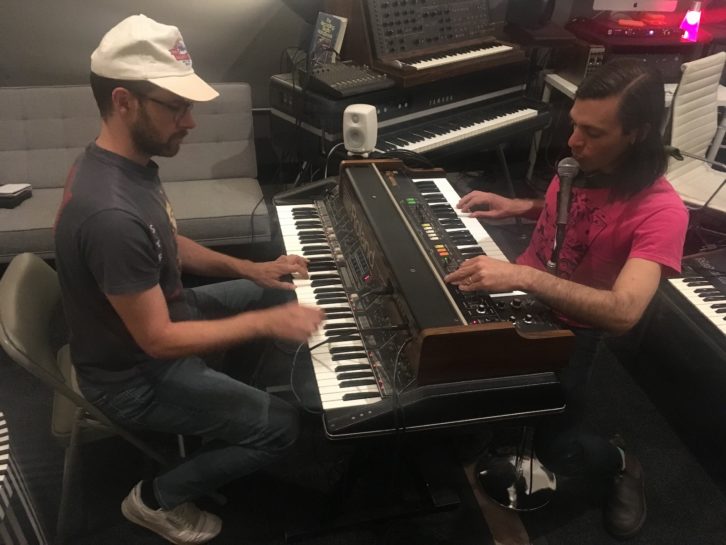
Further sessions for the album took place at Studio G in Brooklyn—which Granduciel booked time from time to time, to brainstorm and record with Robbie Bennett—and in bandmembers’ personal studios. Time was also spent in Southern California at Sunset Sound, EastWest, Sound City, and Vox, where Everett says he captured the one song on the new album that includes almost 100 percent of a full band take: the opening track, “Living Proof.” However, Granduciel later added an inspired acoustic guitar intro that now seems inseparable from Bennett’s sweet piano part.
The album’s other nine songs were all reimagined, rewritten and/or remixed multiple times over the course of three years—even to the point where, once the album was “final” mixed, and mastered by Greg Calbi, Granduciel realized that he wanted to take two steps back and revisit the mixes of several songs. He and Everett then holed up in Everett’s studio and did a 12-hour remixing marathon on several tracks, and then remastered those songs themselves.
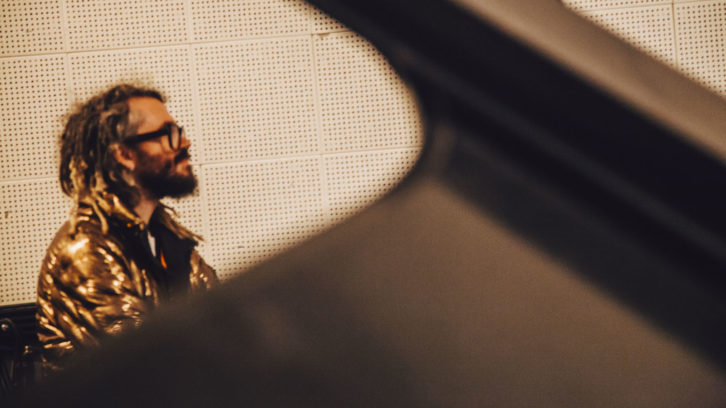
“We basically mimicked what Greg had done to the other songs at that point,” Granduciel explains. “It’s definitely no criticism of the work that Greg does. He’s excellent. It was honestly that I realized I didn’t like the songs. Fortunately, with both Greg and Shawn, there’s no ego about, ‘I did it, so it’s done.’ Just something wasn’t right, and Shawn and I needed to finish it our way. The changes we made in those last 12 hours were really significant to the sound of the record.” The bottom line is, Granduciel, his War on Drugs bandmates and Everett are not done until a song says what they want it to say, musically and emotionally.
“Shawn obviously lends a huge amount to it by getting great sounds, but beyond the engineering side, the ownership he takes in the process means a lot,” Granduciel says. “I have this way of working that could be considered exhausting, but with him, it’s never an issue because he’s always searching, too. Like on the song ‘Change,’ the drum sound on that song was like his white whale. He spent literally a year trying to get it. That can be maddening sometimes because you want to be moving forward, but in the end, we had to do it our way.”
